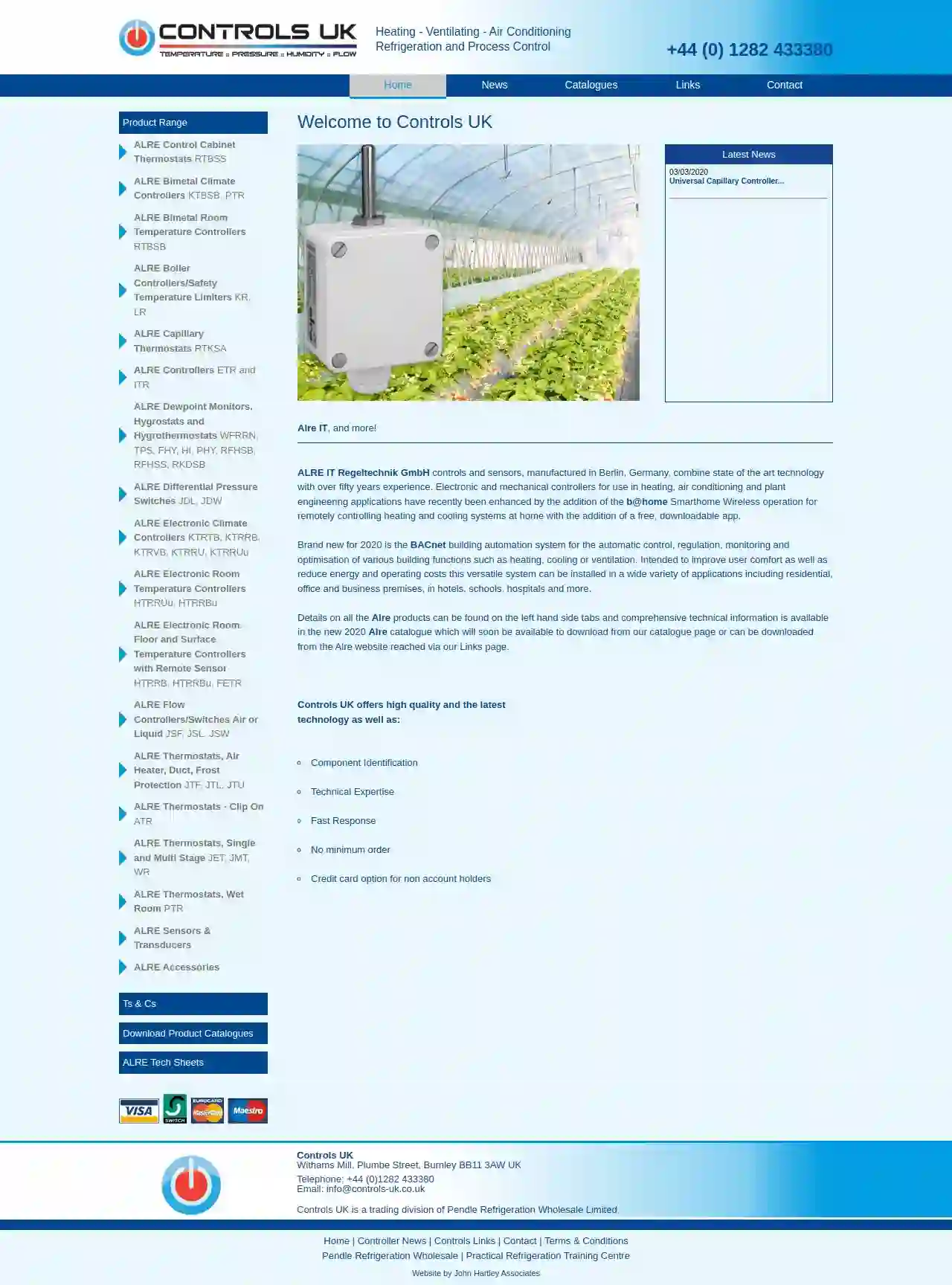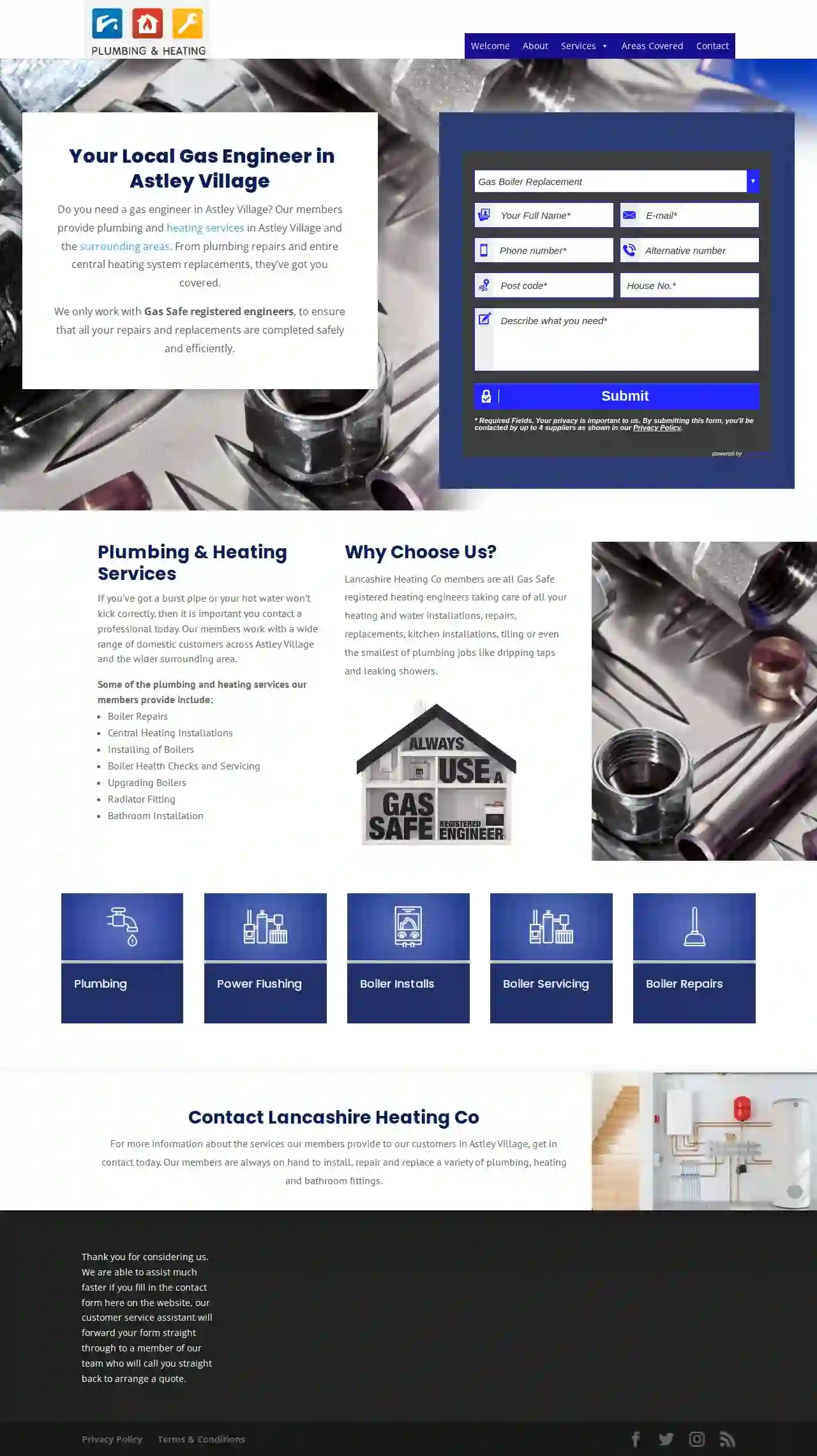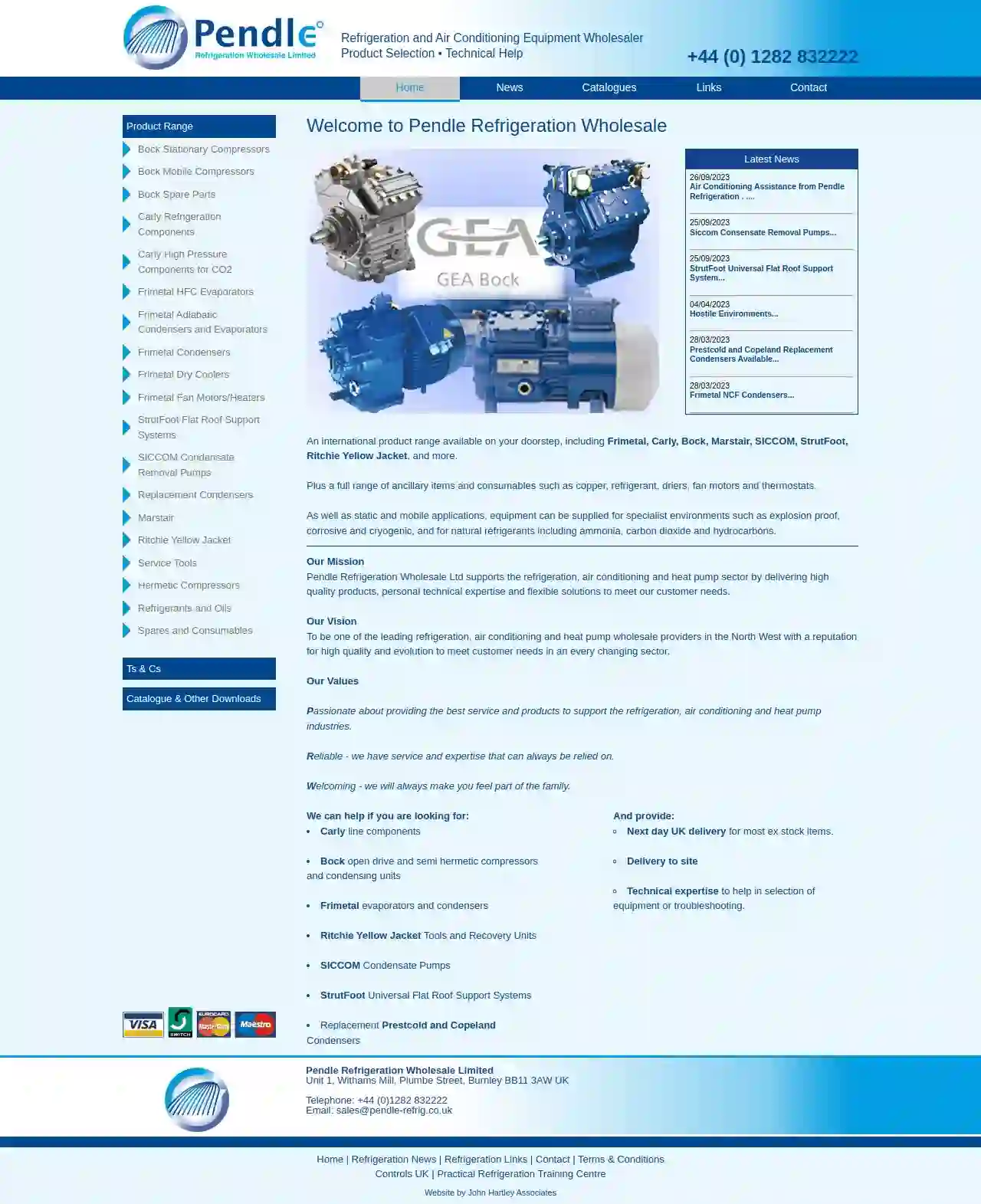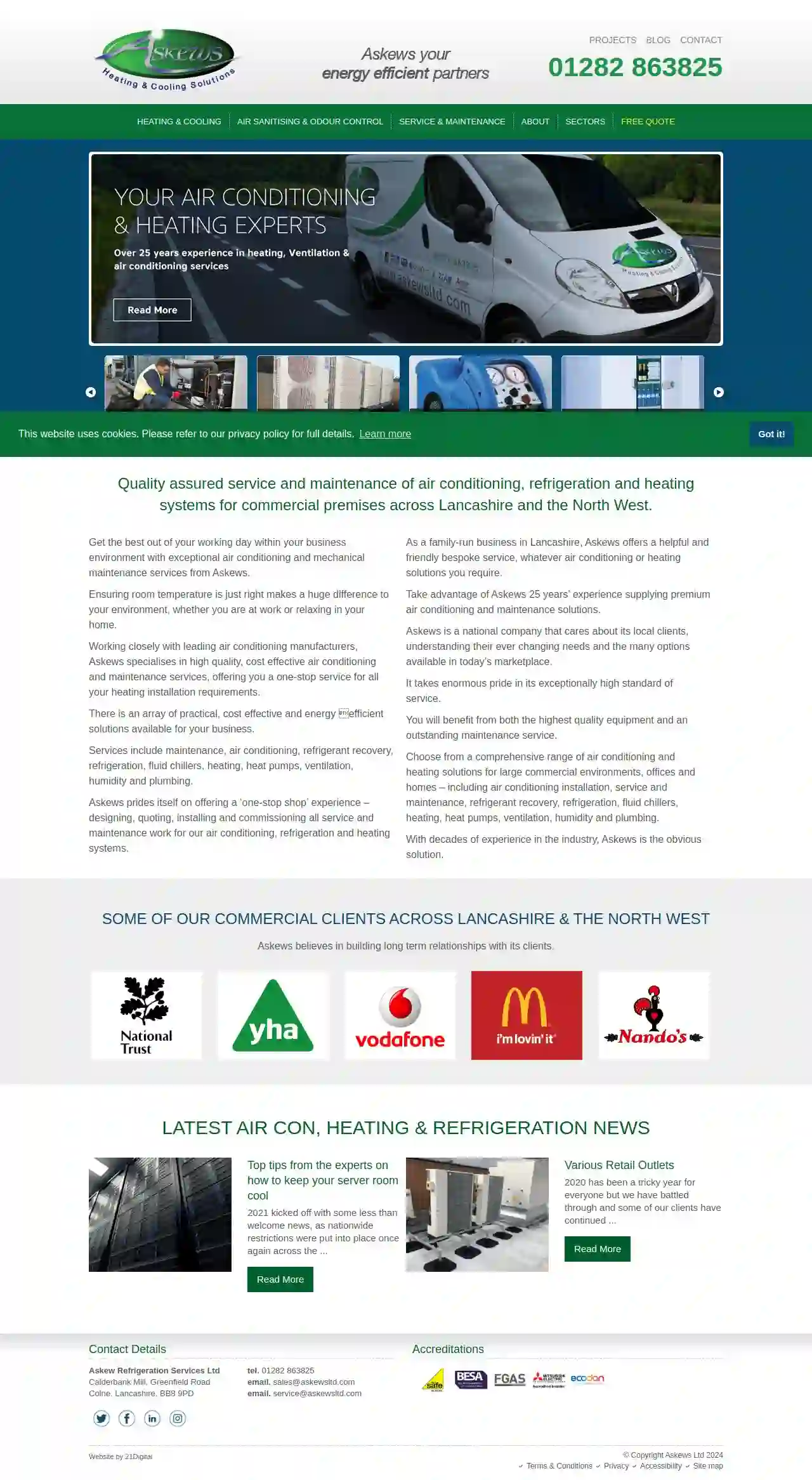Emergency HVAC Garstang
Best Emergency Furnace Repair in Garstang
Receive multiple Emergency HVAC Service quotes for your project today! Compare profiles, reviews, accreditations, portfolio, etc... and choose the best service.

Controls (UK) Ltd
Withams Mill, Plumbe Street, Burnley, BB11 3AW, GBWelcome to Controls UK, a trading division of Pendle Refrigeration Wholesale Limited. We offer high quality and the latest technology in heating, air conditioning and plant engineering applications. Our products include ALRE Control Cabinet Thermostats, RTBSS, ALRE Bimetal Climate Controllers, KTBSB, PTR, and more. We also provide technical expertise, fast response, no minimum order, and credit card option for non-account holders. Our sister company, Pendle Refrigeration Wholesale Ltd, offers Bock compressors and condensers, Frimetal evaporators, Carly refrigeration parts, Yellow Jacket and other service tools, plus a full range of spares and consumables, refrigerants and oils. Our website is designed and hosted by John Hartley Associates Limited.
- Services
- Why Us?
- Accreditations
- Gallery
Get Quote
S Phillipson Plumbing and Heating
53 reviewsChorley, GBLancashire Heating Co provides plumbing and heating services in Lancashire and the surrounding areas. Our members are Gas Safe registered engineers, ensuring all repairs and replacements are completed safely and efficiently. We offer a range of services, including boiler repairs, central heating installations, boiler health checks and servicing, upgrading boilers, radiator fitting, and bathroom installation. Our team is dedicated to providing excellent customer service and ensuring that all our customers receive the highest level of workmanship and professionalism.
- Services
- Why Us?
- Gallery
Get Quote
Upson Plumbing & Heating
Leyland, GBWe are proud to support our local community and here to help you become more efficient at home. Upson Plumbing & Heating has built a credible reputation locally, for offering high quality services at competitive pricing. We offer a range of heating services that include: New boiler installation, Boiler servicing & repairs, Boiler breakdowns, Radiator repairs & installation. We also offer a range of plumbing services that include: New bathroom installation, Repairs to damaged or burst pipes, Installing heated towel rails, Fitting new radiators, Overflow repairs, Leak repairs, Toilet installation, Shower fitting, Fitting new taps and sinks, Repairs to taps and sinks, Any other general plumbing.
- Services
- Why Us?
- Accreditations
- Our Team
- Testimonials
- Gallery
Get Quote
D M H Lanc Ltd
51 reviews47 School Lane, Newton, PR4 3RT, GBTrading as DMH (Lancs) Ltd WELCOME TO DREW MYERSCOUGH HEATING. PROFESSIONAL, WORCESTER BOSCH ACCREDITED HEATING ENGINEER CENTRAL HEATING AND BOILER SERVICES THROUGHOUT THE PRESTON AREAS AND THE FYLDE BY DREW MYERSCOUGH HEATING ENGINEER Hello – I’m Drew. I’m a Worcester Bosch accredited and highly experienced, time served (since 1989) central heating and boiler engineer. I’m able to repair, service and install all makes of boiler. With Worcester accreditation I can provide a 10 or 12 year guarantee on Worcester Bosch boilers and controls! I work hard to ensure that all repairs and installations are carried out in a tidy, methodical and safe manner and I treat every central heating repair or boiler installation as a valuable addition to my portfolio of work that I have carried out in Preston and throughout the Fylde Coast. I have built up many references, testimonials and photographs of my heating work over the years. PROFESIONAL Always aiming to offer the very highest of standards throughout all of the work I carry out, which is reflected in my long established and happy customer base. WORCESTER BOSCH ACCREDITED I’m a Worcester Bosch accredited and highly experienced central heating and boiler engineer. TRANSPARENT BILLING Offering a no call out charge service, you will always know exactly what you are paying for and the service you will expect to recieve
- Services
- Why Us?
- Accreditations
- Our Team
- Gallery
Get Quote
Nigel Lazenby Heating & Plumbing
3.813 reviewsThe Business Centre, 1000 Chester Road, Unit 10, Birmingham, B37 6AA, GBLazenby Plumbing is a family-run business with over 25 years of experience in the plumbing industry. We pride ourselves on providing a reliable, efficient and friendly service to all our customers. We cover all aspects of plumbing, from small repairs to large installations. We are fully insured and Gas Safe registered, so you can be confident that you are in safe hands. Our team of experienced plumbers are dedicated to providing a high quality service at competitive prices. We are available 24 hours a day, 7 days a week for emergency call outs. We offer a wide range of plumbing services, including: Boiler installations and repairs Central heating systems Bathroom installations Kitchen installations Drainage services Leak detection and repair Water softener installations Contact us today for a free quote.
- Services
- Why Us?
Get Quote
Pendle Refrigeration Wholesales Ltd
Unit 1, Withams Mill, Plumbe Street, Burnley, BB11 3AW, GBPendle Refrigeration Wholesale Ltd supports the refrigeration, air conditioning and heat pump sector by delivering high quality products, personal technical expertise and flexible solutions to meet our customer needs. We offer an international product range available on your doorstep, including Frimetal, Carly, Bock, Marstair, SICCOM, StrutFoot, Ritchie Yellow Jacket, and more. Plus a full range of ancillary items and consumables such as copper, refrigerant, driers, fan motors and thermostats. Our equipment can be supplied for static and mobile applications, as well as specialist environments such as explosion proof, corrosive and cryogenic, and for natural refrigerants including ammonia, carbon dioxide and hydrocarbons. We can help if you are looking for: Carly line components, Bock open drive and semi hermetic compressors and condensing units, Frimetal evaporators and condensers, Ritchie Yellow Jacket Tools and Recovery Units, SICCOM Condensate Pumps, StrutFoot Universal Flat Roof Support Systems, Replacement Prestcold and Copeland Condensers. We provide next day UK delivery for most ex stock items, delivery to site and technical expertise to help in selection of equipment or troubleshooting.
- Services
- Why Us?
- Gallery
Get Quote
John Cayley Plumbing and Heating Engineer
554 reviews53 Barrowford Road, Colne, BB8 9QP, GBAs a Gas Safe registered engineer with over 30 years' experience, I'm able to quickly diagnose and resolve all manner of gas boiler faults, including leaks, shutdowns and intermittent hot water. I'm a fully qualified Gas Safe registered engineer bringing over 30 years' experience and a wealth of knowledge to every job. I've built a reputation throughout the Burnley and Pendle area for honesty, reliability and excellent workmanship. I'm able to offer a personal service to my customers, many of whom have me return each year to carry out servicing of their gas boiler and other gas appliances. My customers are reassured that they will see the same friendly face and can expect the same high standard of work each time their engineer attends their property. This continuity of care means that I will get to know your central heating system inside out and will also become familiar with yours and your family's needs.
- Services
- Why Us?
- Accreditations
- Our Team
- Testimonials
- Gallery
Get Quote
Christie Heating Services
523 reviewsCenturian Village, Leyland, PR26 7BE, GBWe are a family-owned and operated business, with over 30 years experience working on plumbing and heating systems. We provide gas boiler service, boiler repair and boiler installation services in Leyland and all surrounding areas. We take pride in our work and strive to provide our customers with the best service possible. You can feel confident you have found a company that is reliable, trustworthy and knowledgeable. After working with large corporations for over 10 years, and our own customers for over 20 years, we understand the importance of great customer service and looking after your home. You don't just want a gas engineer, you want integrity and honesty. A boiler service can be an effective way of reducing boiler repair costs. Boilers and central heating systems are often taken for granted by homeowners, who don't realise that lots of breakdowns, leading to an expensive boiler repair, could be prevented by a regular boiler service and preventative maintenance. We work with all the well known brands, such as Worcester, Vaillant, Baxi and Ideal. We will always advise you on the most effective, cost efficient and appropriate actions that will keep your heating system operating as efficiently as possible, and for as long as possible.
- Services
- Why Us?
- Our Team
- Testimonials
- Gallery
Get Quote
Crw Plumbing and Gas services LTD
514 reviews2 Owen Road, Lancaster, LA1 2AR, GBCRW Plumbing & Gas Services Ltd is a well-established, family run plumbing and gas company based in Lancaster with over 15 years experience. We cover all areas of Lancashire and Cumbria, also taking on work further afield. Here at CRW we welcome a challenge and pride ourselves on our quality of work, no job is too big or too small. We are fully qualified Hetas engineers and all our work is carried out to the highest standard. We install all types of gas, electric and multi-fuel fires to the highest of safety standards. We can repair, replace and install full central heating systems. We can alter, repair and design existing or new bathrooms suites. We are a family run business with a team of experienced plumbers and gas engineers.
- Services
- Why Us?
- Our Team
- Testimonials
- Gallery
Get Quote
Askew Refrigeration Services
54 reviewsCalderbank Mill, Greenfield Road, Colne, BB8 9PD, GBAskews is a family-run business in Lancashire that offers high-quality, cost-effective air conditioning and maintenance services for commercial premises across Lancashire and the North West. With 25 years of experience, they pride themselves on offering a 'one-stop shop' experience, designing, quoting, installing, and commissioning all service and maintenance work for their air conditioning, refrigeration, and heating systems. They work closely with leading air conditioning manufacturers and offer a range of practical, cost-effective, and energy-efficient solutions for businesses. Their services include maintenance, air conditioning, refrigerant recovery, refrigeration, fluid chillers, heating, heat pumps, ventilation, humidity, and plumbing.
- Services
- Why Us?
- Gallery
Get Quote
Over 12,692+ HVAC Companies in our network
Our HVAC companies operate in Garstang and beyond!
HVACCompaniesHub has curated and vetted the Best HVAC Businesses in and around Garstang. Find a top & reliable business today.
Frequently Asked Questions About Emergency HVAC Services
- Raise Your Thermostat: Set your thermostat to a higher temperature when you’re away. Consider using a programmable or smart thermostat.
- Use Fans: Fans can circulate air and make you feel cooler, allowing you to raise the thermostat a few degrees.
- Close Window Coverings: Keep curtains or blinds closed during the day to block out sunlight.
- Limit Heat-Generating Activities: Avoid running heat-producing appliances (ovens, dryers) during the hottest parts of the day.
- Annual AC Maintenance: Schedule yearly maintenance for your air conditioner to ensure it's running efficiently.
- Plant Shade Trees: Planting trees around your home can provide natural shade and reduce heat gain.
What is carbon monoxide, and how can it affect my HVAC system?
How can I cool my home efficiently?
What is a humidifier, and should I use one with my HVAC system?
How can I prevent future HVAC emergencies?
What is carbon monoxide, and how can it affect my HVAC system?
How can I cool my home efficiently?
- Raise Your Thermostat: Set your thermostat to a higher temperature when you’re away. Consider using a programmable or smart thermostat.
- Use Fans: Fans can circulate air and make you feel cooler, even at a higher thermostat setting.
- Close Window Coverings: Keep curtains or blinds closed during the day to block out sunlight.
- Limit Heat-Generating Activities: Avoid running heat-producing appliances (ovens, dryers) during the hottest parts of the day.
- Annual AC Maintenance: Schedule yearly maintenance for your air conditioner to ensure it's running efficiently.
- Plant Shade Trees: Planting trees around your home can provide natural shade and reduce heat gain.